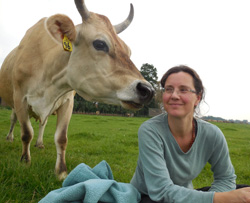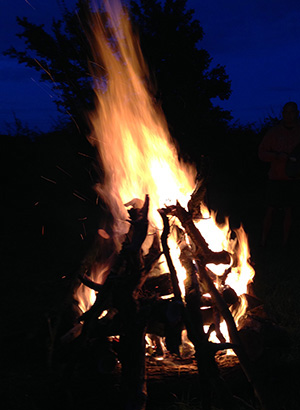Forgotten Connections is about humanity’s ‘forgotten’ connections with the rest of the natural world. Environmentalists and ecologists know a lot about the physical connections and how important they are – what is crucially missed is the connection through consciousness.
“In exploring consciousness are we searching for truth or wisdom? Are we looking for decisive facts or for enlightening experience? Do we want more theory or do we want deeper insights into how we might better live our lives?” 2
Dr. Christian de Quincey,
Professor of Philosophy and Consciousness Studies
at John F. Kennedy University
When it comes to the consciousness of nature, Forgotten Connections believes both are necessary. It has been researching the facts and theory, as well as seeking insight through enabling people to have direct experiences. It explores the ways people can better relate to the other-than-human world because all the evidence indicates that this can bring immense benefits.
As a series of interconnected projects, Forgotten Connections is constantly evolving. Currently it is:
- pursuing on-going research,
- sharing its findings through presentations and publications, as well as producing a documentary,
- running workshops, including Nature Constellations and
- consulting for private clients.
Evolution of Forgotten Connections
The Founder of Forgotten Connections, Melissa Roussopoulos, is a lifelong lover of nature, brought up within mainstream culture and educated to post-graduate level about environmental issues. In 2004, she was astounded to read accounts of communication with animals and plants that went way beyond what she had ever been taught was possible. She realised that, if they were true, a crucially important aspect of reality was being systematically ignored.
Around the same time, attending an organisational Constellations workshop, she witnessed someone representing ‘the environment’ and exhibiting extreme discomfort as a result of industrial pollution. She had worked for many years at an NGO that included the ‘voice of the environment’ by bringing experts from Friends of the Earth and Greenpeace into mainstream decision making.
The question arose: is it possible for ‘the environment’ to speak for itself?
And so began the work that has led to Forgotten Connections. It has always had two strands.
One has been to investigate whether other-than-human nature really is conscious, and capable of mind-to-mind, heart-to-heart communication with humans.
The other has been pioneering the application of Constellations to human-ecological systems as a method to include the voices of nature within decision-making (Nature Constellations).
The two strands have inter-woven and supported each other: the consciousness research has provided insight about what emerges in Nature Constellations; and the Nature Constellations at times reveal information which can be verified, thus validating the hypothesis that nature is indeed conscious and capable of communicating in these ways.
It is worth noting that all applications of the Constellations methodology fundamentally rely on information travelling through mechanisms other than the usual five senses. This is precisely the ‘forgotten connection’, the connection through consciousness, that is the focus of Forgotten Connections’ work. That the method has consistently worked in countless Constellations throughout the world is evidence for such connections being real in the human domain. That they are real throughout the web of life is what is being explored, demonstrated and worked with by Forgotten Connections. The journey continues…
Work to date
As well as filming for the documentary and pursuing on-going research, Forgotten Connections has been holding experiential workshops since 2005. Public workshops have taken place in the UK, Greece, Holland and South Africa.
Private workshop and consultancy clients have included:
- Coventry University, England
- Lammas Ecovillage, Wales
- Schumacher College, England
- Stellenbosch University, South Africa
- international environmental organisations
- large-scale land-owners in the UK and Greece
Contributions to conferences have involved both presentations and experiential work:
- International Systemic Constellations Association Gathering, Croatia 2018
- 1st International Conference Opening Up Biodynamic Research, Evolving Agriculture and Food, Switzerland 2018
- 2nd Annual Psychosocial Conference, UK 2016
- Connecting Fields, Moving Towards a Sustainable Future, Denmark 2013
- Nexus Global Youth Summit, Innovative Philanthropy and Social Entrepreneurship, New York 2012
On the more creative side, events have also been held in festivals and camp spaces, such as Dance Camp Wales and Druid Camp, UK.
Collaborators and Contributors
 There have been various collaborators on the journey, providing inspiration and input, and more are emerging on the research side. Forgotten Connections is particularly appreciative of the on-going engagements with:
There have been various collaborators on the journey, providing inspiration and input, and more are emerging on the research side. Forgotten Connections is particularly appreciative of the on-going engagements with:
- Henk Kieft, Agronomist, Netherlands; and
- Dr Saskia von Diest, post-doctoral researcher at Stellenbosch University, South Africa.
Many contributors to the documentary have freely given their time and insights in support of the project. As have a number of seed funders, as well as potential funders.
Thanks also go to the many people and other-than-humans who have participated in Constellations and shared their voices
and experiences so generously.
Founder and Director, Melissa Roussopoulos

For the last decade, Melissa’s work has been that of Forgotten Connections, as outlined in this website. Her background enabling her to undertake this work successfully is varied.
Melissa’s first degree in Philosophy included studying the philosophy of mind for two years, then she specialised for her final year in the History and Philosophy of Science (BA University of Cambridge 1993). Body Psychotherapy training (Chiron Centre 2001-6) covered the theory and practice of working with the personal and collective conscious and unconscious. These studies have provided the frames to integrate the latest holistic science and consciousness discoveries with the experiential data gathered by Forgotten Connections.
In 2005-6 she trained in Organisational Constellations (COLPI, nowhere Foundation), during which time she published an article on ‘Science and Constellations’. 2007-8 she held a research post at the nowhere Foundation supporting the introduction of Constellations approaches to different professional fields. Two years’ training in Family Constellations (2008, 2010 CSISS) and on-going study of Trauma Constellations (Franz Ruppert’s work) all support and inform her evolving work.
Before 2004 she spent many years working on issues of Sustainability in the environmental sector for NGOs including: a post as Sustainable Business Forum co-ordinator at The Environment Council; work on ethical accounting for the New Economics Forum; and research in Brazil for Pro-Natura International. She also worked as an independent researcher producing a report on ‘Sustainable Development – the Role of People’ for the Austrian Chamber of Commerce.
The above work built on a multi-disciplinary MSc in Natural Resource Management (University of Leicester 1995) as well as MSc courses on International Development and Economics (Institute of Latin American Studies 1998-2000).
The observant reader may have noticed that Melissa’s early training and work included much analytical, mind-oriented activity – which is also the way most of our culture relates to environmental questions. Study the science, work out a solution, then tell people about it so changes follow. Or do they? A turning point was the ‘Sustainable Development – the Role of People’ research process, which revealed that if lasting change is sought, the mind has limited impact, while emotional processes are very important. The shift to experiential methodologies brought in more radical ways of knowing and what appears to be a paradox emerged:
the ‘forgotten’ connections with nature are about consciousness,
yet the way to access them is through more embodiment.
Is this a paradox or merely a false duality between mind and matter? This is on-going research for Melissa as she explores body, heart, mind and soul to deepen her own connection with nature. Perhaps it can only be a personal investigation, but if wisdom emerges she will undoubtedly share it. For the moment, she keeps dancing with the inquiry, metaphorically and literally. She welcomes people joining her on the dance floor…
1 Williams, M. (2005) Beyond Words: Talking with Animals and Nature. New World Library, California, USA, p. 16.
2 C. de Quincey (2005) Radical Knowing, p 16.
